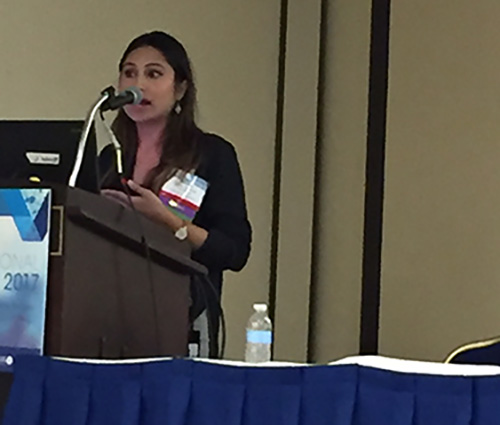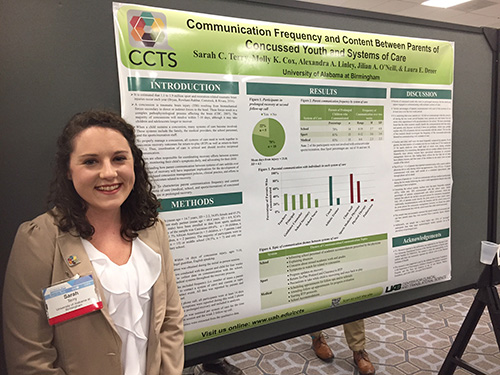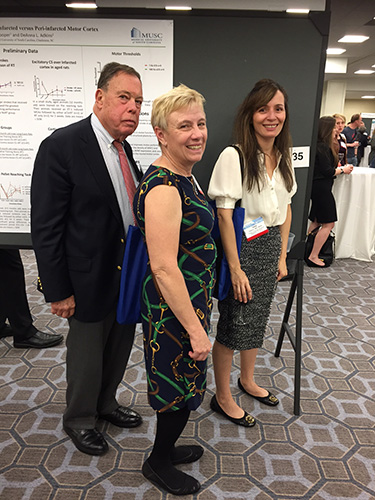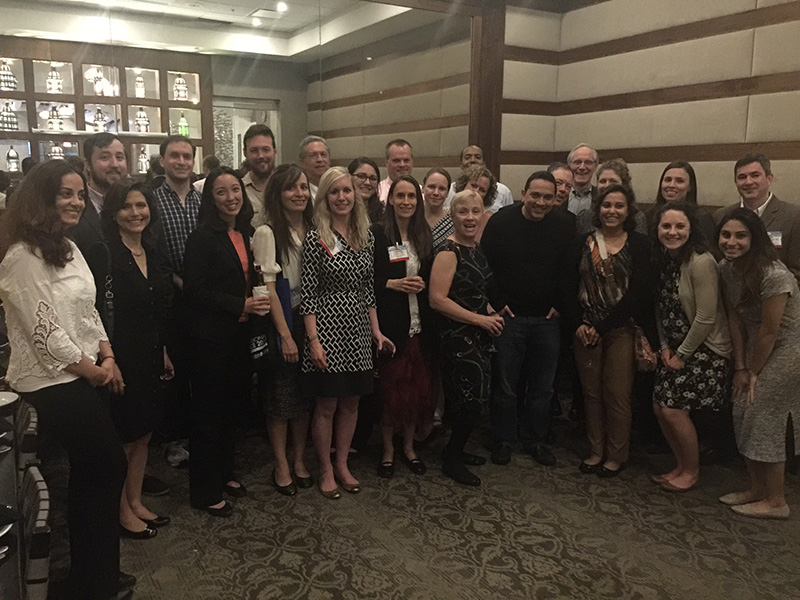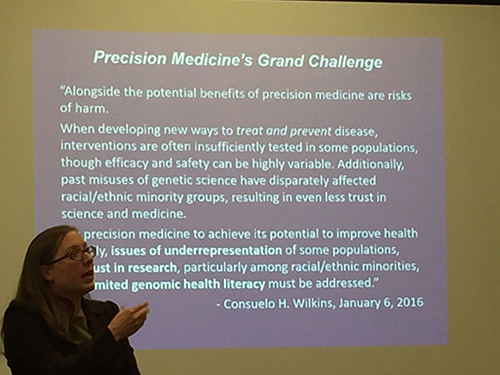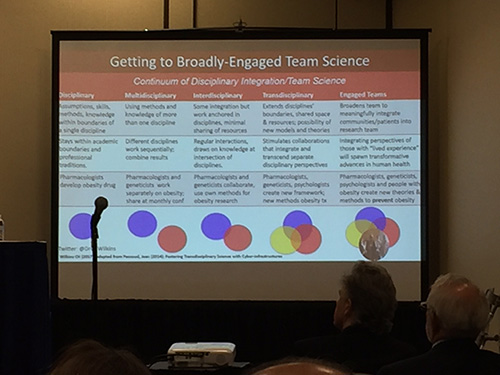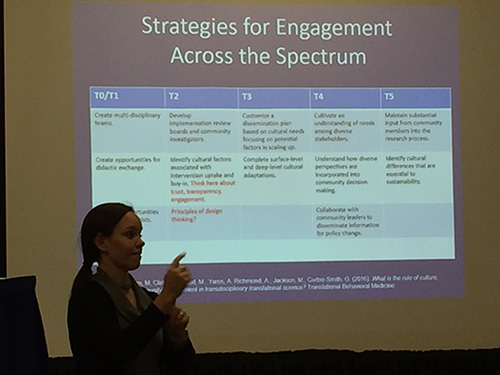The annual Translational Science meeting, hosted by the Association for Clinical and Translational Science, presents an opportunity for scientists, trainees, and staff from a variety of research disciplines to gather for the “shared benefits of networking and education.”
TS17 drew nearly 1,000 participants, a 50% increase from last year. CCTS was well-represented, with participants from seven of our partners presenting panel sessions and posters, visiting policy makers, discussing best practices, and exploring novel approaches to shared challenges in every domain, from clinical trials to community engagement.
TS17: CCTS Highlights
Dr. James Willig, UAB Associate Professor of Medicine and Co-Director of CCTS Informatics, discussed his Kaizen platform in a session on innovative products for curriculum design. Drawing on concepts of gamification, the platform been shown to be an effective way to enhance learner engagement and to reinforce educational competencies. The CCTS has leveraged Willig’s Kaizen platform to help young researchers meet NIH’s requirement of formal training in rigor, reproducibility, and transparency (it’s not too late to join the fun and earn your certificate in R2T).
Dr. Mona Fouad, CCTS Special Populations Lead and UAB Senior Associate Dean, discussed her work with patient navigators at a session exploring promising social and behavioral interventions to eliminate disparities and improve health outcomes. The program has led not only to an increase in the inclusion of minorities in cancer clinical trials but was also found effective at helping retain minorities for the duration of the study.
For those unable to attend TS17, you can catch up with both Drs. Willig and Fouad at the next CCTS Forum on Wed. June 7, when they will give encore presentations of their TS17 talks.
Several CCTS trainees presented their work at TS17 as well, including Shima Dowla (UAB TL1 alum) and Chad Washington (University of Mississippi Medical Center KL2 scholar), who were invited to give Distinguished Pre- and Post-Doctoral Presentations. Their talks on phenotypic characteristics of pediatric non-alcoholic liver disease and sildenafil for the treatment of cerebral vasospasm following aneurysmal subarachnoid hemorrhage, respectively, were well-received.
Several CCTS TL1 trainees received awards for their posters, including Zachary Lehane (Tulane School of Medicine) for “Posttraumatic Stress Disorder associated with Hurricane Katrina Predicts Cardiovascular Disease Events among Elderly Adults,” which received a Top Ranked Poster Award (awarded to the top 10% of all TL1 posters). Kelsey Campbell (UAB Medical Clinical Psychology Program) and Rebecca Duron (UAB School of Medicine) each received a Blue Ribbon Award for their posters (awarded to the top 25% of all TL1 posters). It is notable that every TL1 poster submitted by CCTS was accepted.
Dr. Molly Wasko, CCTS Executive Council member and professor and associate dean for Research, Innovation, and Faculty Success, UAB Collat School of Business, and Courtney Peterson, a CCTS KL2 scholar, also presented posters.
Dr. Wasko’s poster, “I-Corps at NCATS: Toward Entrepreneurial Training for Clinical and Translational Investigators & Lessons Learned in Team-Based Customer and Satisfaction Discovery,” featured an interdisciplinary team of investigators (see list below) that has been tasked by NCATS to adapt the NSF I-Corps™ curriculum to better support the translation and commercialization of biomedical discoveries.
As Wasko explained to TS17 poster session attendees, the goal of “I-Corps@NCATS” is “to help clinical investigators fully participate in the commercialization process from idea generation to clinical application, better preparing them to compete for SBIR/STTRs and other NIH national programs.” The team’s hypothesis is that investigators trained by I-Corps@NCATS will be able to produce more innovative ideas, take a more informed perspective to evaluate the clinical and commercial impact of an idea, and more quickly prototype and test new solutions in clinical settings.
I-Corps@NCATS Team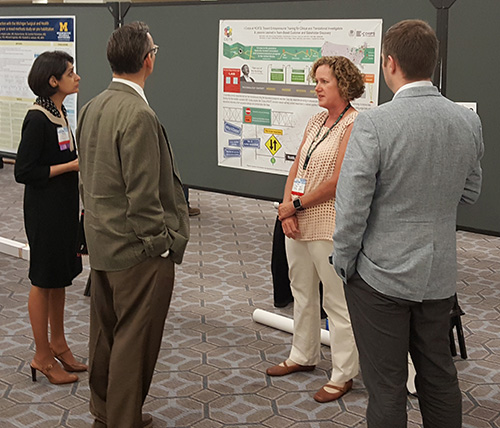 Dr. Molly Wasko discusses her I-Corps@NCATS poster at TS17.
Dr. Molly Wasko discusses her I-Corps@NCATS poster at TS17.
| Key Personnel | Institution |
| Molly Wasko | UAB |
| Bruce Conway | Rockefeller |
| Elaine Morrato | UC Denver |
| Sara Love | HMC-PSU |
| Nate Hafer | UMass-Med |
| Nick Kenyon | UC Davis |
| Pamela Bhatti | Ga Tech |
| Suhrud Rajguru | Miami |
| Seth Zonie | Johns Hopkins |
| Jonathan Fay | Michigan |
If you want to learn more about what I-Corps training offers for biomedical scientists and engineers, don’t miss Wasko’s upcoming webinar on May 15!
No TS meeting would be complete without the annual CCTS Scholars’ Dinner, which was held once again at the Lebanese Taverna. This year’s dinner drew a record number of trainees interested in “Community. Collegiality. Collaboration.” And celebrating their success as well! A special thanks to Tulane University site PI Dr. Roy Weiner and CCTS Training Academy Director Dr. David Chaplin for organizing.
TS17: Key Themes
The TS17 meeting also gave CCTS participants a chance to hear from clinical and translational science leaders in academia, government, and industry. Several key themes emerged:
- Rare diseases, of which there are ~ 7000 and affect more than 25 million people in the U.S., represent an opportunity for collaborative innovation in the fields of informatics, telemedicine, and precision medicine. Synergized efforts could accelerate disease diagnosis as well as treatment discovery and dissemination.
- The Trial Innovation Network, comprising Trial Innovation Centers, Recruitment Innovation Centers, and CTSA Hub Liaison Teams, is focused on harmonizing processes to overcome traditional clinical trial roadblocks and so increase their efficiency and quality and speed their impact on human health. An immediate goal is to accelerate trial time to activation by moving CTSAs to the SMART IRB platform.
- The All of Us program, an NIH precision medicine initiative that aims to follow 1 million subjects across the lifespan to accelerate health research and medical breakthroughs, “enabling individualized prevention, treatment, and care for all of us,” will be ready to enroll soon. All of Us Director Eric Dishman emphasized the project will help “prevent the promise of precision health from becoming ‘boutique medicine.’” The project will also deliver “the largest, richest biomedical data set ever captured that is easy, safe, and free for people to access—a national resource.” All of Us represents an area of “common ground” with the CTSA program.
- NIH Deputy Director Dr. Larry Tabak called for accelerated training of a physician-scientist workforce, suggesting research training during medical residencies as well as interdisciplinary career development a la the Lasker Scholars program, the NIH dual Master’s program in clinical research, and the NCATS Eli Lilly externship program. He also mentioned a recent evaluation of productivity showing a decrease after a PI receives a 3rd R01. The NIH is considering capping the number of R01s available to any one investigator to increase the number of younger investigators who could be funded, which might represent “a better balance of finite resources.” The NIH has gone so far as to estimate the number of PIs with 3 or more R01s who might be affected (~2300) as well as those who might be helped (~2500).
- Informatics challenges repeatedly came up, including the need to scale up efforts to integrate multiple discrete datasets to support multisite studies and improve the sharing of data for research; generating evidence to inform policy decision making, clinical practice guidelines, and learning health systems; and doing a better job at asking questions of the data we already have, especially more pragmatic and clinically relevant questions. In pointing to an FDA dataset on 180 million Americans and the PCORI national evidence system of 110 million people (including 40 million who are clinical trial worthy), Tabak said, “If we do it right, we just might inspire patients to look for trials instead of the other way around.
- Team science that incorporates community members as active participants is replacing “imperial trialism.” Patient engagement is not recruitment, and community engagement is not outreach. Both represent relationships grounded in trust. Such relationships take time to develop, but the value add is worth it. NIH supports the idea, with Tabak noting “it is more important to know the person who has the disease than what kind of disease a person has.”
- The CTSA program is a platform for enabling science, developing the skills and capacities that can be leveraged by clinical studies and trials at scale, emphasizing speed and efficiency and the use of big data (both new and already in hand) to ask the important questions. Training is a key cross-cutting foundation for developing a workforce capable of reaching these goals.
CCTS is actively engaged in sharing all that was learned at TS17 with our Partners, the better to work together to align the regional mission we share with the evolving national goals of the CTSA program. An important consideration, as we move into our grant renewal year, is how to evolve our regional research ecosystem, including building new relationships with industry and community partners, in a way that can capitalize on and accelerate these grand opportunities?
CCTS would like to congratulate all of our TS17 presenters (for the complete list, see Visit Us at Translational Science 2017!). See pictures from the meeting below.
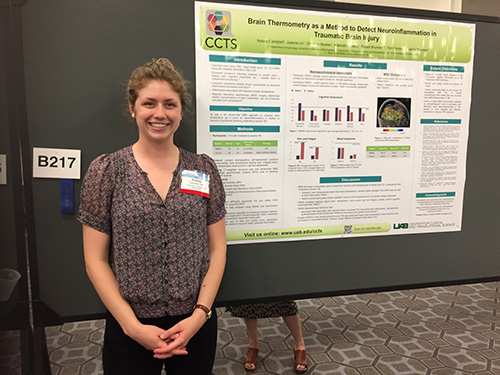
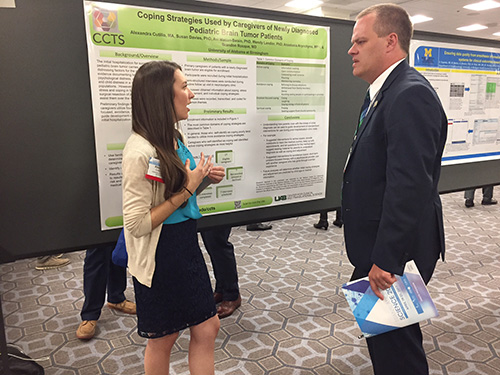
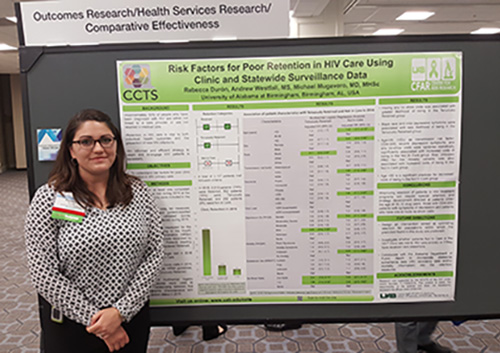 Rebecca Duron TS17 (TL1 trainee)
Rebecca Duron TS17 (TL1 trainee)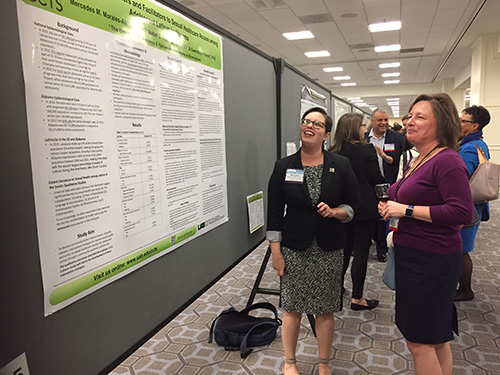
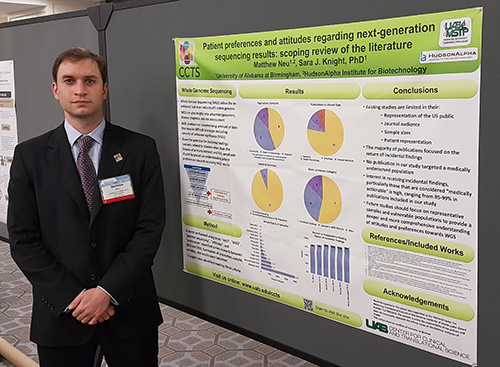 Matthew Neu TS17 (TL1 trainee)
Matthew Neu TS17 (TL1 trainee)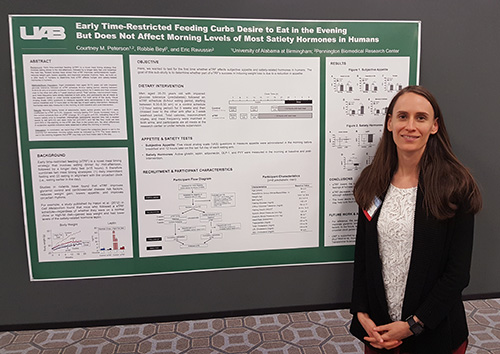 Courtney Peterson TS17 (KL2 scholar)
Courtney Peterson TS17 (KL2 scholar)